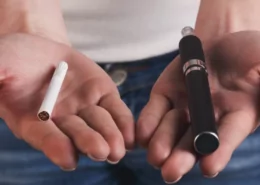Australia Bans Menthol Cigarettes, Introduces Sweeping Tobacco Reforms
As of April 1, 2025, Australia has introduced a comprehensive set of new laws that significantly change the appearance, ingredients, and packaging of tobacco products. The Australian government passed this package of tobacco laws in late 2023, which includes several key measures:
- Standardized tobacco pack and cigarette stick sizes, eliminating novelty pack sizes and cigarette lengths
- Updated and improved graphic health warnings and quitting advice inserts within all tobacco packs
- Warnings printed directly on cigarettes
- Banning ingredients that enhance the flavor and ease of smoking tobacco, including menthol
Retailers have a three-month grace period to sell any old stock already in their stores by July 1.
Refreshed Graphic Health Warnings
Australia’s cigarette packaging requirements have remained unchanged since 2012, when the country introduced groundbreaking plain packaging laws that banned the use of all on-pack logos and branding. While large graphic health warnings effectively prevent smoking uptake and aid in quitting, their impact diminishes if not refreshed and varied regularly.
Under the new laws, cigarette packages must carry one of ten new health warnings, including fresh warnings that smoking doubles the risk of cervical cancer and leads to diabetes. These warnings will provide new information to many smokers. The new requirements also include warnings for roll-your-own, cigar, bidi, and shisha tobacco packaging.
Direct Warnings on Cigarettes and Ingredient Restrictions
In addition to the packaging changes, cigarettes themselves must now include one of eight health warnings printed directly on the filter paper, following Canada’s lead in 2023. The size, shape, and color of cigarettes have also been standardized to prevent tobacco companies from using unique designs to attract new users.
Furthermore, the ingredients permitted in cigarettes are changing, with a ban on additives that enhance the flavor of tobacco. The extensive list of prohibited ingredients includes cloves, sugar, probiotics, vitamins, and menthol or any ingredients that mimic menthol’s cooling properties.

The Significance of Banning Menthol
Menthol masks the harshness of smoke, making it easier for inexperienced smokers to tolerate the rough effects of tobacco smoke in the throat. This helps create a more pleasant smoking experience that young users are more likely to repeat. The introduction of crushable menthol capsules in cigarette filters has proven particularly popular with Australian teenagers, with those who use these products being more likely to have recently smoked and have higher smoking intentions in the future.
Countries that have already banned menthol have seen drops in tobacco sales and use, as well as increases in quitting behaviors.
The Contrasting Situation in the United States
Despite the efforts of tobacco control groups advocating for a menthol ban for over a decade, the United States has not implemented similar reforms. Menthol cigarettes, which have been heavily marketed to African American people since at least the 1950s, make up one-third of the total US cigarette market share.
Although the US Food and Drug Administration (FDA) proposed a rule banning menthol in 2022, the ban was not properly enacted before the change in administration. In January 2025, the Trump administration completely withdrew the ban, which was predicted to reduce total smoking by 15% and the number of smoking-attributable deaths among African Americans by up to 238,000.
The Need for Further Reforms to Combat Illicit Trade
Australia still faces challenges in stamping out the illicit tobacco market, with organized criminals operating in the country’s tobacco supply chain to illegally import and sell tobacco products. The government must take action to gain control of the supply system, including implementing strict licensing of the entire tobacco supply chain and timely, transparent reporting on the size and scope of the illicit market.
Businesses that sell illicit tobacco must face severe consequences, including large fines, loss of operating licenses, and criminal charges. All aspects of the tobacco supply chain, from wholesalers to retailers, must be tightly controlled to effectively combat the illicit trade.
- Austria Plans to Ban Disposable E-Cigarettes - August 5, 2025
- Vaping vs. THC Drinks: Which Cannabis Option Is Right for You? - August 4, 2025
- Colombia’s New Vape Law: A Reality Check on Enforcement - August 4, 2025



 flum float review
flum float review
